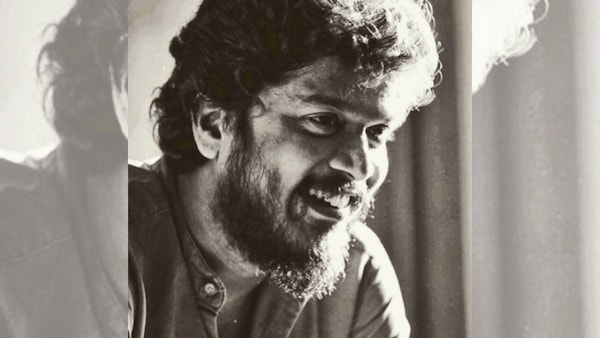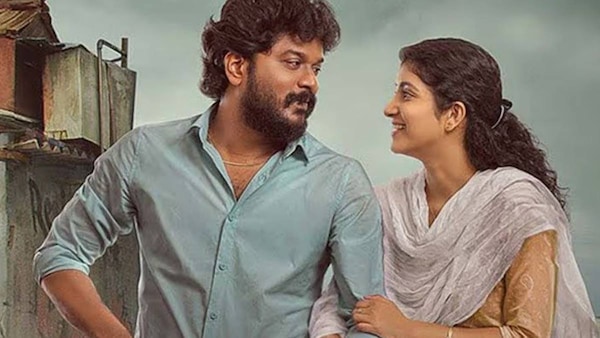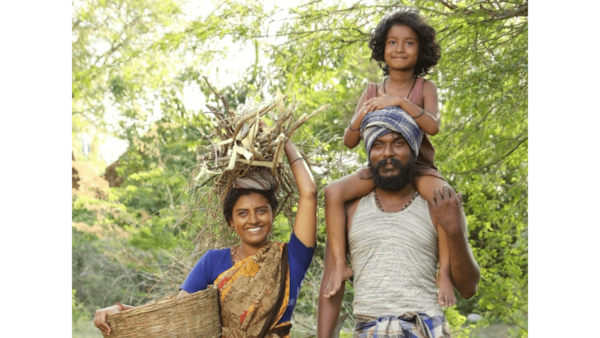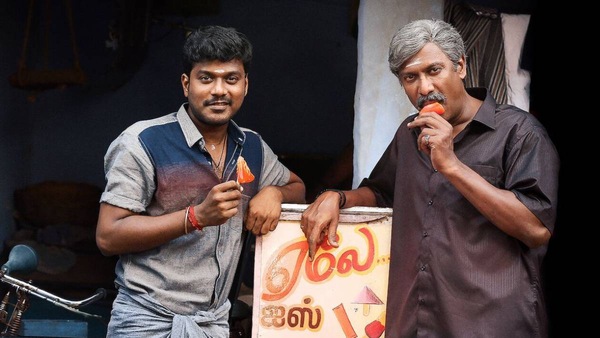The Manikandan Interview | 'I Don't Aspire To Understand The Universe'
Manikandan chats with Subha J Rao about making it in the Tamil film industry, what drives him to better himself with every successive project, and how he navigates the struggle called life.

'Life hums to a different Math,' Manikandan tells us
Last Updated: 12.49 PM, Jul 16, 2023
SOME years ago, when Manikandan was still an upcoming actor trying to make his place in tinseltown, an assistant director requested him to share his room with an accompanying artiste. Manikandan resisted as much as he could, before finally giving in. Some thought he was being arrogant, others thought he was acting too big for his stature. Only Manikandan knew the real reason.
The next morning he walked to the sets to find many sniggering at him and laughing — the accompanying artiste had told everyone how he struggled to sleep because of Manikandan’s snoring. “It felt like a slap, like my deepest secret had been revealed to all, without my consent,” recalls the writer, director and actor. “Growing up, many people have recorded me snoring and made fun of me. But after I entered the industry, I went to great lengths to protect myself from ridicule. I did not travel in public transport at night, I did not sleep in front of others, and then this happened.”
And so, when Manikandan first heard the script of Vinayak Chandrasekaran’s Good Night, and the character of Mohan, who snores and struggles to find love, he just had to say yes. The film recently completed a 50-day theatrical run and is now streaming on Amazon Prime Video.
The simple plot resonates with all — and it helps that Mohan is played by the incredibly self-effacing Manikandan, who has the audience rooting for him when he feels super shy around a girl he likes, and walks on eggshells around the woman he’s married to. Does she lose her sleep because of his snoring? Is she tolerating him? He’s constantly on edge.
As an actor, Manikandan has actively prevented himself from being stereotyped. After Jai Bhim, he received not just similar, but a spate of almost the same roles — a poor tribal person suffering injustice. “When I said no, people thought I was being difficult. But I am trying to build a body of work that features works that are different in tone and nature,” says the director of Narai Ezhuthum Suyasaritham, streaming on Sony LIV.
In a leisurely conversation over the phone, the actor spoke about the struggle called life, making it in the Tamil film industry and what drives him to better himself, film to film, and learning the fine art of saying no. Edited excerpts:

You’re not just an actor but also a writer and director. At what stage of working on Good Night did you know the film is shaping up well?
While making any film, you get a vibe at some point that things are falling into place. But the bigger picture reveals itself to you during dubbing. That’s when you know the jokes are landing, the twists are working. The finest test of all is the first day, first show. For Good Night, it was at GK Cinemas, Porur.
I was surprised to see a full house — this is the first film that I am headlining, and I was tense. I asked the producer if he had ‘arranged’ the audience. He had not.
It was lovely to see that crowd for a non-star film. Some people said they came to see Manikandan’s film, because he chooses well. That felt great.
You’ve always received critical validation. But the box office needs to speak too, right, to help you get the budget you need?
Completely. Actors need commercial validation too. I was just telling a friend that Good Night has finally given me an entry ticket to films that I like to do. It has given me the power of choice. I don’t have to fall into any formula or template or model. There are some lovely scripts doing the rounds, but no one was backing them. Probably, the success of this film will nudge producers to consider bankrolling them. Probably, it will become easier for young filmmakers to pitch novel scripts and convince producers.
You always say filmmaking is a collaborative process. How was it for Good Night?
Extremely collaborative. Many nuances entered the script following conversations. We lived and worked like a family. I’d call the person who played my mother ‘Amma’, Raichal Rebecca — who played my elder sister — ‘Akka’, and so on. I always call Ramesh Thilak ‘Mama’, and in this film I had to call him that too. Because we interacted this way, there was a democratic process during filming. There was a scene involving the astrologer where it was originally written that Ramesh’s character should react. But Raichal said, “This involves me. Should I not be the one reacting?” And it made sense to us. Not one person in the film felt that their dialogue is going to someone else or that they are being shortchanged. We all worked together to create something lovely. This camaraderie lent a certain realism to the film.
The tone was also non-judgemental…
We were all very particular that in no scene should it appear that we are ridiculing someone who snores. If any of us felt that tone had crept in, we would immediately discuss it with the director and work on it.
While some people surrounding Mohan might see him as an object of ridicule, the film did not see him that way — which is why you saw the script showcase him, layer by layer. Which is also why the audience felt he was one of them. They felt his pain.

You’ve been very popular for your mimicry. Some know you as a writer, director and actor. What do you see yourself as?
Ah, I’ve been thinking a lot about this. One day, when waiting outside a tea shop during my struggling days, a friend was telling someone what he’d read in a book — that one has to first recognise and realise who one is. It was not a novel thought, but it hit me like a ton of bricks. Here I was, wanting to make it big, without knowing how much pain I could handle, without knowing my ability to handle future popularity or heartbreak.
And now that I am in a position better than where I began from, I realise that I am yet to learn to say no without feeling bad about it, or dealing with how it upsets others. If you’re not firm, people will convince you that a project you don’t like is the best for you. They will convince you that replicating a successful film is a smart thing.
I’ve now realised that cinema is a trade body. Let’s set aside the creators. The trade sees something that works and only wants to repeat it — be it scripts or performers in certain roles. But if I need to tell them something won’t work for me, I need to know myself first. And I know that I don’t want to do the same thing repeatedly. Forget the audience getting bored, I’ll get bored, even if they give good money. It helps that my needs are minimal. After Sila Nerangalil, I wanted to do something in the humour genre. And so, Good Night…
People in the industry will tell you you’ll become the next big thing after choosing a similar script, but it is so difficult to convince your heart regarding it. I don’t want to ever enter the victim zone.
You’re a rank(ing) student who was the first in the family to study. You then left it for cinema, an outsider who has made it big.
I went where life took me. I did not plan or aim for something. When the roles dried up, I took up voice acting. I kept honing my craft. A psychiatrist friend told me that while I was not actively planning, I had something in my subconscious and was working towards that.
Barring Halitha Shameem (Manikandan asked to be cast in her Aaley, as a son who is not very fond of his father), I’ve never asked anyone for work. It comes on its own. Everything happens for a reason. I began a YouTube channel that failed. But that was the reason why Pa Ranjith called me to work on Kaala.
Life is fascinating — it hums to a different Math... I don’t aspire to understand the universe, it is fleeting and something brings us reasons to live.
After Good Night, there was major talk that you’ve hiked your remuneration to Rs 2 crore. Those who knew you laughed. How did you react?
I laughed too. How does one even react to something they’ve concocted and written? I am very happy with my work. As for the money, even if it came, I probably won’t spend it on myself. My needs are very limited. I shy away from even a Rs 2,000 shirt. What money means to me is that the fear I had about 10 years ago, of handling a sudden medical emergency, has taken the backseat. I know I can deal with it.
My parents, though, still worry about my non-steady income. They’ll be really happy if I go back to IT.

In an industry that celebrates but also derides new talent, how did you nourish the artiste in you?
Discouraging someone is the easiest thing to do. All you have to tell them is, “Dei, un velaiyaa paaru” (Hey, just do your job). They’ll ridicule folks like me who look unconventional and are not traditionally good looking.
You often credit your voiceover phase with teaching you a lot (in the Tamil dubbed versions, Manikandan voices the father in 102 Dalmatians and the evil roach in Oggy and the Cockroaches)...
Definitely. It taught me how to emote when the camera is on. A dubbing artiste can turn something that is wrong into something right.
I began working on documentaries. I did have some pronunciation issues, but Saravanan, an engineer with Discovery Tamil, taught me patiently. All the QC checks would have the ‘Mani la’, because I never got the difference between la, lla and zha. And then I learnt.
What is your dream set?
Something that is egalitarian. Where everyone focuses on the overall well being of the product. Jai Bhim director Gnanavel once told me that we need to surround ourselves with people with a difference of opinion. Only then will the brain bloom.
What’s your biggest takeaway from these years in the industry?
The gift of people’s acceptance. For someone with a lot of insecurities and inferiority complex, this acceptance is like a dose of energy. It helps me constantly work on myself and become a better person. Manikandan’s personna is created by people’s love.

 Premium
Premium